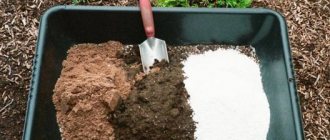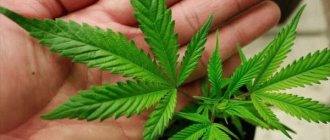Hemp in our country is a prohibited plant, the illegal cultivation of which is subject to criminal liability under Art. 231 of the Criminal Code of the Russian Federation “Cultivation of hemp.”
Hemp, or marijuana as it is also called, was previously actively used in the production of fabrics, ropes, tows, and hemp oil. Today, many people know this plant as a raw material for drugs.
That is why people are prohibited from growing this “grass” at home, in their gardens, in their country houses and in other places unless they have a license and permission to do so.
Responsibility for growing hemp in 2021
The Criminal Code of the Russian Federation has a separate article numbered 231, which clearly states the punishment for the illegal cultivation of drug-containing plants.
Thus, for breeding and growing cannabis on a large scale, the perpetrator or perpetrators may face the following punishment:
- monetary penalty of up to 300 thousand rubles;
- performance of free work by a convicted person in his free time from his main place of work for a period of up to 480 hours;
- restriction of freedom of a convicted person for up to 2 years;
- imprisonment for up to 2 years.
The punishment for growing cannabis will be harsher if:
- A group of people were engaged in illegal activities.
- The attacker was engaged in the cultivation of prohibited grass on an especially large scale.
In these cases, the perpetrators will face the following punishment:
- imprisonment for a term of up to 8 years with restriction of freedom (up to 2 years) or without such restriction.
What is meant by the term “large” and “extra large” size in hemp cultivation cases?
In the Decree of the Government of Russia No. 1002 of October 1, 2012, as amended on June 22, 2018, “On approval of significant, large and especially large amounts of narcotic substances,” in the paragraph where cannabis, also known as marijuana, is listed, the following meanings are established:
- significant size - over 6 grams;
- large size - over 100 grams;
- especially large size – over 100 kg.
From top to bottom
She has been involved in hemp for 43 years and knows almost everything about this culture. With her participation in the KNIISH named after P. P. Lukyanenko, the first varieties with a very low content of tetrahydrocannabinol (THC) were developed.
Tatyana Sukhorada has been breeding hemp for 43 years and knows almost everything about this crop. Photo: AiF/ Alexander Vlasenko
It is this compound that has a psychotropic effect on humans. Those plants of the Cannabis sativa species that the breeders started with contained about 2% THC, which is already very little for weed lovers. And new Krasnodar varieties contain less than 0.1%. According to the World Health Organization, this amount does not have a narcotic effect on humans. But this is not the only advantage of varieties bred in Kuban.
The head of the laboratory invites me to see with my own eyes the results of many years of work by Kuban scientists. To do this, we go to the outskirts of Krasnodar, where one of the institute’s fields is located. Here, on an area of two hectares, the dioecious hemp variety "Victoria", bred just two years ago, is propagated. The height of these plants is amazing, because of which it is impossible to take in the entire field with a glance.
Krasnodar hemp grows much taller than human height. Photo: AiF/ Alexander Vlasenko
There is no specific smell near the field, which is one of the indications of the scanty THC content. Outwardly, these crops resemble reed thickets, but, unlike reeds, the scope of hemp is disproportionately wider.
“This is hemp fiber,” Tatyana Ivanovna immediately begins to explain, breaking the stem of one of the plants with her hands. — It is used to produce the most durable fabrics, ropes, ropes and other products. In general, today more than 25 thousand types of various products can be made from hemp. Figuratively speaking, both the tops and the roots go into action.”
Article on the topic
Laboratory under the sky. Breeder on import substitution and products of the future
After such words, ordinary people may giggle. The image of hemp that has been developing over the years as exclusively a raw material for drugs is doing its job. But everything said is true. Almost any product that is made from wood, cotton or oil can be obtained from this plant. Biofuel can be produced from it. The cellulose from one hectare of hemp is enough to produce the same amount of paper as from four hectares of 15–20-year-old forest, and besides, it is stronger and more durable. The same goes for hemp fabric. Its seeds are used to make porridge, flour, milk, butter and other food products. They are not only nutritious, but also have health benefits due to the presence of essential amino acids in an easily digestible form. Due to the special properties of hemp, in many countries around the world it is used to make medicines used in the treatment of a variety of diseases, including cancer. Hemp can also be used to produce environmentally friendly building materials.
And even in the defense of the country, this plant is very valuable, because it produces good gunpowder. It was traditionally made from cotton, but it does not grow in Russia, and therefore hemp may be of strategic importance for Russia. For many years, the Central Research Institute of Chemistry and Mechanics has been successfully engaged in relevant developments commissioned by the Russian Ministry of Defense. The results were presented at the X International Exhibition of Arms, Military Equipment and Ammunition Russia Arms EXPO – 2015.
The new variety of drug-free hemp “Victoria” is liked not only by farmers, but also by pests. Photo: AiF/ Alexander Vlasenko
What is hemp cultivation?
Cultivation of hemp refers to the creation of conditions under which the “grass” will not only grow well, but will also be resistant to adverse weather conditions.
Cultivation also refers to actions aimed at improving cultivation technology, developing new varieties, increasing the yield of hemp, etc.
According to Art. 18 of Federal Law No. 3-FZ of 01/08/1998 “On Narcotic Drugs” it is prohibited to cultivate hemp on the territory of Russia.
The only exception is the cultivation of this “weed” for its further use for educational, scientific purposes, as well as in industry (if it is not used for the manufacture of drugs).
Cultivation of hemp for further legal use for educational and scientific purposes can only be carried out by state enterprises that have the appropriate license.
Cultivation of hemp for industrial purposes can only be carried out by legal entities or individual entrepreneurs.
Traditional hemp
Today, hemp is strongly associated with a drug, and we can even be punished for selling things with its image.
For example, five years ago in Sochi, a batch of caps with leaves of this plant embroidered on them was seized. The store was accused of promoting dope and fined, and the hats themselves were burned. It is necessary to fight drugs, but many people were perplexed at the time. Article on the topic
From hemp to space: the history of VDNKh’s transformation “If any design of hemp is considered evil, then what about the “Friendship of Peoples” fountain at VDNKh in Moscow, where there is a sculptural image of this plant? - they asked. “And why haven’t they yet banned the flag of the Kimovsky district of the Tula region, which also has hemp on it?”
And in stores they freely sell porridge and other products, on the packaging of which you can see characteristic narrow, sharp leaves. Did Themis overlook it, or is there different types of hemp?
For an answer to this question, I go to the Krasnodar Scientific Research Institute of Agriculture - KNIISH named after P. P. Lukyanenko. And already in its hall, in the middle of an exhibition of varieties of wheat, barley and other agricultural crops bred here, I come across a dried tall sheaf of hemp.
In the hall of the KNIISH named after P. P. Lukyanenko, among the exposition of the varieties of wheat, barley and other agricultural crops bred here, there is a sheaf of southern dioecious hemp “Zenitsa”. Photo: AiF/ Alexander Vlasenko
Logically, in comparison with the Sochi caps, this is just god knows what. But it turns out that not everything is so simple, because there are drug-free varieties. They have been breeding them here for more than forty years, and therefore they know well that it is wrong to consider this plant itself a drug.
“Hemp has been grown in Russia since time immemorial, and it has been our traditional agricultural crop,” says Tatyana Sukhorada, head of the laboratory of hemp selection and seed production at the KNIISH named after P. P. Lukyanenko, Doctor of Agricultural Sciences . — Ropes, yarn, fabric, sails, hemp oil and other products were made from it. Moreover, the Russian Empire received its main income from the trade in furs and hemp - hemp fibers. It was also one of the main crops in the USSR. At one time, the Union accounted for more than 80% of the world's hemp crops. By sowing only 5% of their fields with it, farms received half of all income from it.”
Cannabis cultivation: when is there criminal and when is administrative liability?
For growing hemp (cannabis), from which marijuana is made, law-abiding citizens may be subject to administrative or criminal liability. It all depends on the amount of cultivated “grass” .
So, if a person grew hemp on a small scale, then he faces administrative liability in accordance with Art. 10.5.1. Code of Administrative Offenses of the Russian Federation: a fine of 1.5-4 thousand rubles or restriction of freedom for a period of 15 days.
If before May 19, 2010, a person faced criminal liability for cultivating hemp even in small quantities, then since 2010 administrative liability has been provided (in accordance with amendments to Federal Law No. 87-FZ).
By small size we mean growing cannabis of no more than 20 bushes. If there are more than 20 bushes, then this is already criminal liability.
"Mown" industry
If Russian history had turned out differently, perhaps it would be hemp, and not hydrocarbons, that would be called a national treasure today. In the current circumstances, this would be very useful, given the situation with oil prices. But it turned out the way it turned out. If we once ranked first in the world in hemp crops, now Russia accounts for about 1%. And China has become the leader in this area. Its rapid economic growth proves that they know what they are doing. And all this despite the fact that the attitude towards drugs in the Middle Kingdom is far from liberal. They wouldn’t get involved with hemp farming if they saw it as a threat to the nation.
A hemp field looks like a reed thicket. Photo: AiF/ Alexander Vlasenko
How did it happen that this unique and traditional culture for Russia has almost disappeared from our fields, and one can now get a fine for just depicting it? Several factors contributed to this. It all started with the fact that in a relatively short period of time the number of marijuana and hashish consumers in the country has increased significantly. “Weed” lovers have gotten into the habit of visiting collective farm fields, although industrial hemp is poorly suited for making the drug due to its low THC content. And because of this, farmers have problems with the law. Collective farm chairmen began to be put under pressure, brought to justice, and many began to refuse to grow hemp.
In 1973, the KNIISH named after P. P. Lukyanenko and several other scientific institutes in the country were tasked with developing hemp varieties with the lowest possible THC content. But the good results of this work did not help the cannabis industry globally. The fact is that over time, new problems have arisen in the industry. Modern harvesting and processing equipment was not produced, and there was no strategic planning. Although Tatyana Sukhorada believes that in any case, everything would not have ended so sadly if the industry had not been helped to collapse from the outside. In the Krasnodar Territory, the last hemp factories were scrapped in the early 90s, and in neighboring Adygea only one survived.
Article on the topic
Left without a harvester. Why doesn't the machine cooperative system work?
How to open a business for growing industrial hemp in Russia
Copies of documents that confirm that the license applicant has equipment, premises and land plots, the rights to which are not registered in the Unified State Register of Rights to Real Estate and transactions with it (if such rights are registered in the specified register - information about these premises and land plots)
How to open a business for growing industrial hemp from scratch
In order to start your own hemp growing business, it is enough to register a business entity form. It is unlikely that it will be possible to register a peasant farm enterprise, although in this case it will be possible to enjoy not only tax benefits, but also other incentives from the state for agricultural entrepreneurs. I would like to believe that when the government understands the importance of cultivated hemp, the number of benefits and support will increase even more (this, in any case, has been the case throughout history, when rulers encouraged the cultivation of this crop).
We recommend reading: The bank can take away the only home from a large family to pay off the mortgage loan
Hemp can be processed into biofuel, fabrics and paper are made from it, food products are produced from the seeds - hemp oil, flour. Even gunpowder can be obtained from hemp. Almost anything made from oil, cotton or wood can be made from hemp. Hemp is the future! Moreover, quite recently the State Drug Control Agency approved the cultivation of industrial hemp.
Works in the trash
The Hempico cooperative has been engaged in hemp production since 2021. According to project manager Sergei Savenkov, industrial hemp is one of the most promising areas in agriculture. Although industrial hemp farming existed successfully in the Soviet Union, in modern Russia it is developing practically from scratch, and the niches of possible products from the crop are empty. However, Hempico plans to become profitable only this year. The first years were spent developing the scientific and technical base together with institutes, and the cooperative began to monetize its products only recently.
One of the company's achievements was hemp tea. There are several types of it in the Hempico collection. Each product description states that the product contains less than 0.1% THC and less than 1% CBD (cannabidiol). The company claims in its advertising materials that tea relieves anxiety, promotes weight loss and sound sleep, protects the nervous system from degeneration and is good for the heart.
Hempico tea was developed two years ago together with the Krasnoyarsk State Agrarian University. The partners conducted numerous studies to prove the nutritional value of the product. Before entering the market, Hempico voluntarily underwent an examination to ensure the legality of the tea. Then the company conducted a psycholinguistic analysis to ensure that the design of the product did not fall under Article 6.13 of the Code of Administrative Offenses of the Russian Federation (propaganda of narcotic drugs). We entered the market carefully, having discussed with representatives of the State Administration of the Ministry of Internal Affairs of Russia that the cooperative would act transparently, through notifications, and thereby encourage new market players to behave in the same way.
Sergey Savenkov
head of the cooperative Hempico
In 2021, new participants began to enter the market, picking up our “invention,” and all our work was thrown into the trash. The product is very specific, and here you need to use your head, understanding that supervisory authorities are also involved in this matter. Someone came in on the hype: they say, we are now going to organize legalization - the emphasis was placed incorrectly. Our negotiations with such companies did not lead to anything, and as a result there was a sharp negative effect - everyone lost.
By negative effect, Savenkov means the refusal of marketplaces to sell products, the detention of sellers, and the complaint of Safe Internet League activists to the Ministry of Industry and Trade with a request to introduce pre-moderation of ads in online stores. Volunteers of the organization pointed to the facts of “the sale of narcotic substances under the guise of food products by individual sellers in the largest online stores Ozon and Wildberries.” The Ministry of Industry and Trade, in turn, sent an appeal to the Ministry of Internal Affairs.
"More than just a mistake"
In addition to the unprofessional behavior of market players, another factor played an important role, says the head of Hempico - the decree of the President of the Russian Federation on the Strategy of State Anti-Drug Policy until 2030. This is an updated version of the previous document, which was valid until 2021. The new decree has strengthened anti-drug policy, says Anastasia Ichetovkina, legal consultant at Mi& Ko. New measures include identifying and suppressing the operation of Internet resources used to promote and distribute drugs, the formation of anti-drug commissions, attracting volunteers to implement policies, developing systems for monitoring the drug situation, and others.
Sergey Savenkov
head of the cooperative Hempico
One of the market participants had their products blocked on the marketplace. He flew to Moscow and began, roughly speaking, to download his license. He did this unprofessionally and was unable to protect this product, that is, an ordinary seller who does not understand the production process decided to justify the legality of the product. His unprofessionalism caused a chain reaction.
We are talking about Maxim Shevchenko, the founder of the company, which, according to Kontur.Fokus, is engaged in growing tea. He was caught in March 2021 with more than thousands of tea bags. According to the Ministry of Internal Affairs, it contained marijuana, or tetrahydrocannabinol (THC). True, its quantity was not measured (the permissible content is no more than 0.1%). Another reason why tea is controversial may be that it looks similar to marijuana.
Sergey Larin
founder of HempForLife
As far as I understand, the examination was carried out not on the amount of THC in hemp, but on its presence. Even if the THC content is lower than permitted, the test will still show that it is present. This is a very significant thing because people are subject to a criminal offense, and in terms of numbers the law has not been broken. It’s like this everywhere with hemp: it seems possible, but it’s not.
The case is still under investigation, one of the market players reports. According to the source, the problem may be “more than just a mistake by the Ministry of Internal Affairs”; most likely, there is a problem with documents, because it is impossible to make a narcotic drug from industrial hemp itself. At the time of publication of the material, the Ministry of Internal Affairs did not respond to Inc.’s about the status of the case.
In addition, at the end of March, the Abakan City Court began an administrative case against Altuma LLC for promoting narcotic drugs. The reason was an appeal received by the Main Directorate of the Ministry of Internal Affairs with a request to check hemp tea, which is sold on various sites, including large marketplaces Ozon and Wildberries. The brands “Big Shoe” and “DoctorDja” (owned by Altuma) raised questions: their names hint at narcotic varieties of hemp, and the tea packages depict leaves and inflorescences of the plant. As a result, the court dismissed the case because the website hemp-chai.rf , where the products were located, does not belong to Altuma.
Scared marketplaces
In the footage published by IA Khakassia Live, you can also see the inspection of Wildberries, which took place earlier, in February 2021. After this, the marketplace informed sellers that it would not list hemp products or products with hemp in their packaging. However, Wildberries now has a variety of hemp products (including food) other than teas. The same thing applies to Ozon and Yandex.Market. And on SberMegaMarket and AliExpress you can also buy Hempico tea.
When asked why Wildberries abandoned hemp teas, the head of the company’s press service, Valery Prokopyev, says: “Food products are still a special segment,” that is, there are more requirements for them. As for hemp teas, the question for him is whether they are allowed for sale in the Russian Federation.
Sergey Savenkov
head of the cooperative Hempico
At first, the wave was entirely for all industrial hemp products, then they returned in larger quantities to marketplaces: oil, seeds and flour, but not tea. Marketplaces saw this as risks and possible losses due to the suspension of their activities. The guys were simply scared. Although, while this whole story was happening, we were quietly selling our products through the website and other small marketplaces, and continued to work with distributors.
Due to the negative wave, sales of Hempico tea fell by 80%. Marketing investments in the product turned out to be unprofitable, and refocusing on other sales channels, according to Savenkov, will not return the former customer loyalty to tea. At the same time, the entrepreneur believes that such reactions from the Ministry of Internal Affairs enlighten people and teach them to work correctly.
Promising market
The market for hemp products in Russia was growing at a rapid pace until 2021. If in 2010 less than a thousand hectares of industrial hemp were sown, then in 2021 - already 10.5 thousand hectares, and the market for hemp food products has grown 4 times over the past three years. This is influenced by the newness of the industry and the growing trends towards healthy lifestyles and environmentally friendly products.
One of the few full-cycle players in this market is the Konoplex holding, which has been engaged in hemp production since 2015 and produces food and fiber from industrial hemp. The company's total investment in the industry exceeds 2 billion rubles.
Last year, Konoplex opened a plant in the Penza region for the production of healthy food products from hemp and other crops, investing 300 million rubles in the enterprise. The products are produced under the Konoplyanka and Kitchen of Happiness brands and are available on various trading platforms, including Ozon, Wildberries and Yandex.Market.
Konoplex does not see any special relationship between marketplaces and hemp products. At the same time, the company notes: the controversial reputation of hemp and the excessive attention of some departments to legal products have a negative impact on the market.
Milena Alexandrova
General Director of Management Company "Konoplex"
It is necessary not only to clearly distinguish between the concepts of narcotic and non-narcotic industrial hemp, but also to carry out extensive information work with representatives of government agencies, businesses and consumers. We are carrying out this work together with the Agro-Industrial Association of Hemp Growers (APAC), talking about the crop, its capabilities, areas of application, and beneficial properties.
Floating hemp field
HempForLife has been involved in hemp products since 2013. It was launched after founder Sergei Larin visited a manufactory in Nepal that makes clothes from hemp. He liked that it was cozy, or “warm,” as the entrepreneur says. Larin first sold imported hemp clothing, and then launched his own production. Later, the range was expanded to include food and cosmetics. HempForLife received its first profit five years after its launch.
Even though Larin and his team had never been in the tea business, his business also suffered. At the beginning of the year, HempForLife decided to place its textiles on Wildberries. According to Larin, at first the marketplace approved the delivery and accepted the goods into the warehouse, and the next day announced: “No, we will not sell your items because they contain hemp fiber.” What is wrong with hemp fiber has not been explained.
Sergey Larin
founder of HempForLife
Three pallets of our goods were stuck at Wildberries, and we still haven’t received them back. The company responds to us once a month that it cannot yet return the goods.
Upon request from Inc. Wildberries responded that they would contact HempForLife and find out what happened. “I was already planning to write a complaint to them,” Larin reacts.
HempForLife products can be found on Yandex.Market. The company has not yet placed its products on Ozon, but plans to do so. According to Larin, the marketplace has banned teas, and for other food products it is asking for tests for THC content (in seeds, kernels). Ozon did not comment on Inc. its policy regarding industrial hemp products.
Due to the vagueness of concepts, HempForLife has difficulties promoting products. The Law on Advertising prohibits advertising of plants containing narcotic drugs and their parts. According to Larin, the social networks VKontakte, Facebook, and Instagram do not advertise products with hemp. It is also difficult to advertise through Google and Yandex, even if the content talks about the technical part of the product and its legality. For sites, these are serious risks and fines, explains Larin.
Advertising products made from industrial hemp on VKontakte is not prohibited, but moderators carefully monitor the content of ads, the press service of the social network says. Cosmetics, clothing and food products made from industrial hemp are moderated. The social network will reject the ad and regard it as propaganda if it contains images or references to plants that are directly or indirectly related to narcotic substances. “The advertiser can always receive an explanation and recommendations on how to adjust the ad so that it complies with the rules of the social network,” says the VKontakte press service.
Sergey Larin
founder of HempForLife
There are many problems and difficulties in the hemp market - with cultivation, processing, technology. The most important thing is that there are no clear regulations and norms in terms of the separation of concepts. And in such a floating field, people do not understand what is legal and what is not. These include officials, marketplaces and other companies.









